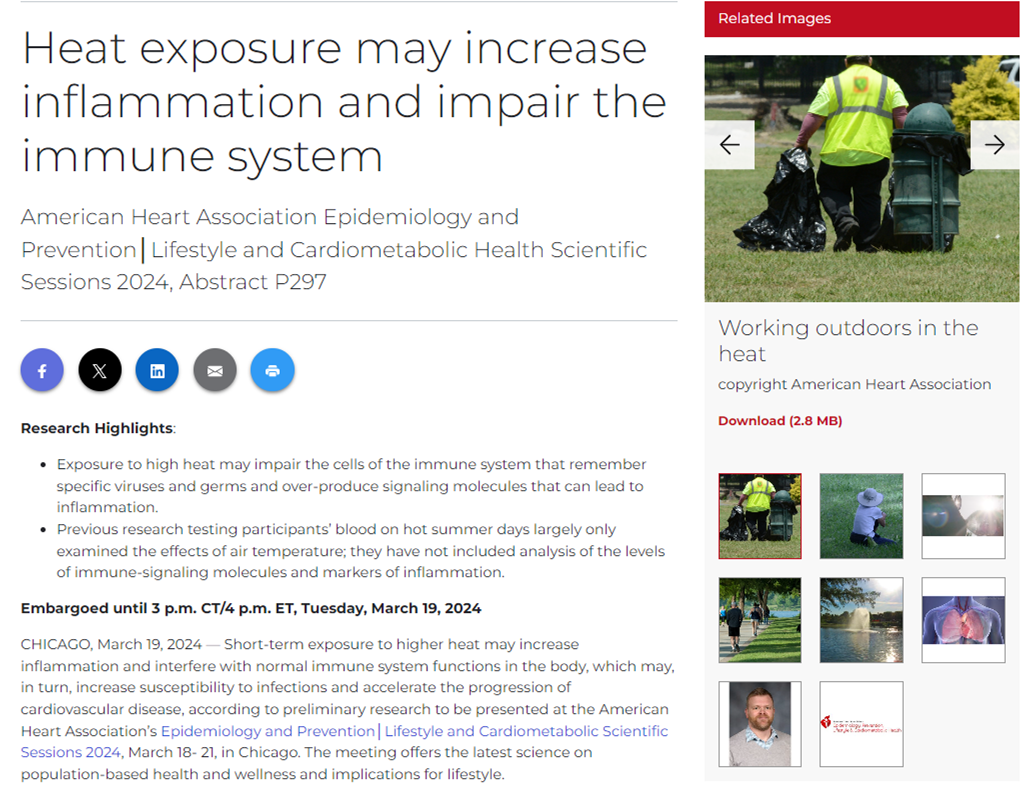After entering July, temperatures across Taiwan have soared, resulting in a record-high number of heat-related injuries. The number of people seeking medical attention for heatstroke and myocardial infarction has also increased compared to previous years. According to the latest research from the American Heart Association, high temperatures not only pose a risk of heatstroke but can also damage the immune system, leading to infections and inflammation.
This summer, temperatures are particularly high, leading to a surge in heat-related injuries and a significant increase in respiratory diseases compared to previous years. Research has found that high temperatures can trigger the release of various inflammatory substances in the body, such as eosinophils, natural killer T cells, and tumor necrosis factor-α, causing immune system inflammation.
The study, published in March at the American Heart Association's "Lifestyle and Cardiometabolic Health Scientific Sessions," analyzed blood samples from 624 individuals aged 20 to 70. The results indicated that high temperatures are related to immune response indicators, including certain blood cells and inflammation markers. This study was published in March at the American Heart Association's "Lifestyle and Cardiometabolic Health Scientific Sessions". (Photo/Heho Health)
This study was published in March at the American Heart Association's "Lifestyle and Cardiometabolic Health Scientific Sessions". (Photo/Heho Health)
Causes of Immune System Inflammation Due to High Temperatures
Research shows that moving from no heat stress to moderate heat stress, equivalent to an increase of 5 degrees in the "Universal Thermal Climate Index" (UTCI), can cause immune system inflammation. Short-term exposure to high temperatures may exacerbate inflammation, disrupt immune system function, and increase the risk of infection.
High-temperature environments trigger a series of heat stress responses, protecting cells from heat damage. However, prolonged heat stress can cause immune cells to release large amounts of inflammatory factors, such as cytokines and interleukins, leading to systemic inflammatory responses. High temperatures can also cause dehydration, affecting electrolyte balance and weakening the immune system's normal function, increasing the risk of infection and inflammation. Additionally, high temperatures can increase the production of free radicals in the body, inducing inflammatory responses. Avoid prolonged exposure to high temperatures. (Photo/Heho Health)
Avoid prolonged exposure to high temperatures. (Photo/Heho Health)
Methods to Prevent Immune System Inflammation Due to High Temperatures
Faced with heat waves, Dr. Jiang Guan-Yu, an attending physician in the Integrated Medical Care Department of the Zhongxing Branch of Taipei City Hospital, offers the following recommendations:
- Maintain Adequate Hydration: Increase water intake in high-temperature environments to avoid dehydration. It is recommended to drink at least 200 ml of water per hour and avoid beverages containing caffeine or alcohol.
- Replenish Electrolytes: After exercise or heavy sweating, supplement with electrolyte-containing drinks, such as sports drinks, to maintain electrolyte balance.
- Avoid Prolonged Exposure to High Temperatures: Avoid outdoor activities during midday or afternoon high temperatures. If you need to go out, wear a hat, lightweight breathable clothing, and take regular breaks in shaded areas.
- Pay Attention to Diet: Eat foods rich in antioxidants, such as fresh fruits and vegetables, to help combat free radicals and reduce inflammatory responses.







